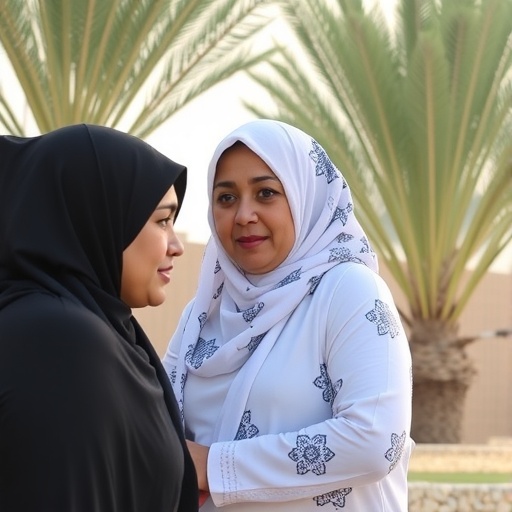In recent years, environmental sustainability has become a pressing concern globally, and the United Arab Emirates (UAE) is no exception. A recent study conducted by Elmassah and Hassanein, published in Discover Sustainability, delves deep into the relationships that exist between women’s empowerment, financial development, and effective natural resource management in the context of the UAE. This research provides vital insights, showcasing the interplay among these elements and revealing how they together contribute to advancing environmental sustainability in the region.
The UAE, known for its rapid economic growth and urbanization, faces significant environmental challenges. Water scarcity, energy consumption, and waste management are critical issues that underscore its vulnerability to climate change. As a result, strategic interventions are necessary to ensure that development remains sustainable. One focal point of the study is the crucial role of women’s empowerment as a catalyst for sustainability initiatives. Empowering women leads to more inclusive decision-making and offers unique perspectives essential in addressing environmental challenges.
Women have often been underrepresented in environmental governance, despite their potential contributions. The authors assert that by integrating women into leadership roles within environmental management, the UAE can harness a wealth of knowledge and innovative ideas. Numerous successful case studies across various sectors highlight women’s substantial influence on environmental decision-making, demonstrating how inclusive policies can foster sustainability. Women’s perspectives on resource allocation, conservation practices, and community involvement can lead to more sustainable outcomes.
Financial development is another vital component discussed in the research. The study emphasizes that financial resources are crucial for implementing effective sustainability strategies. Investment in green technologies, renewable resources, and sustainable practices largely depends on the availability of financial capital. The authors explore how access to finance empowers individuals and communities to engage in sustainable practices, thus highlighting the need for governments and institutions to prioritize investments in green initiatives.
Furthermore, the authors delve into the notion of natural resource management as an intertwined facet of sustainability. Effective management of resources such as water, energy, and land is critical for the long-term resilience of the UAE’s environment. The study outlines the necessity of integrating scientific research and traditional knowledge to create adaptive management strategies that consider both modern innovations and local practices. By fostering collaboration between scientists, practitioners, and local communities, the UAE can enhance its natural resource management frameworks significantly.
It is essential to recognize the interdependencies among these elements—women’s empowerment, financial development, and natural resource management. The authors propose that the synergy created by these elements can lead to holistic sustainability solutions. For instance, women who are economically empowered are more likely to make informed decisions regarding resource usage and conservation. In turn, effective natural resource management strategies can enhance financial opportunities for women, creating a virtuous cycle that supports sustainable development.
The research further highlights potential obstacles to achieving these synergies. Cultural norms, unequal access to financial resources, and insufficient representation of women in decision-making processes can hinder progress. The authors argue that addressing these barriers requires a multi-faceted approach, incorporating legal reforms, educational programs, and community engagement initiatives. Policy-makers must actively seek to level the playing field, ensuring equitable access to resources and opportunities for all.
Elmassah and Hassanein’s study also reviews successful initiatives that have already been implemented in the UAE. Various programs aimed at empowering women in environmental sectors exemplify how progressive policies can yield positive outcomes. For instance, initiatives focused on encouraging women’s participation in green jobs and environmental education have shown promising results, revealing the potential for scaling these efforts nationwide.
As the UAE strives for economic diversification and sustainability, understanding the dynamics of these interrelated factors becomes acutely important. The research urges stakeholders—governments, businesses, and civil society—to recognize women’s contributions and integrate their perspectives into sustainability frameworks. A truly sustainable future for the UAE hinges on collaborative efforts that transcend traditional roles and embrace inclusive decision-making.
In conclusion, the work of Elmassah and Hassanein calls for a re-evaluation of current strategies regarding environmental sustainability in the UAE. Through the empowerment of women, coupled with financial development and efficient natural resource management, the potential to create a sustainable future becomes more attainable. The study not only sheds light on the prevailing challenges but also opens avenues for innovative solutions that can redefine how sustainability is approached in the region. As the UAE positions itself on the global stage, embracing these principles will be key to leading the way in sustainable development efforts.
By elevating women’s voices, investing in human capital, and ensuring responsible stewardship of resources, the UAE has the opportunity to emerge as a beacon of sustainability in the modern world. This research serves as a clarion call for a more inclusive and progressive approach to environmental governance, promising a resilient and thriving future for generations to come.
Subject of Research: Environmental sustainability in the UAE and the interplay of women’s empowerment, financial development, and natural resource management.
Article Title: Advancing environmental sustainability in the UAE: the interplay of women’s empowerment, financial development, and natural resource management.
Article References:
Elmassah, S., Hassanein, E.A. Advancing environmental sustainability in the UAE: the interplay of women’s empowerment, financial development, and natural resource management.
Discov Sustain 6, 1006 (2025). https://doi.org/10.1007/s43621-025-02002-1
Image Credits: AI Generated
DOI: 10.1007/s43621-025-02002-1
Keywords: Women’s Empowerment, Environmental Sustainability, Financial Development, Natural Resource Management, UAE




